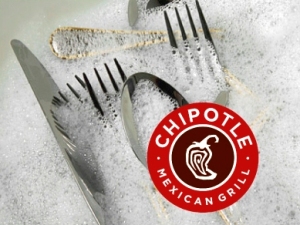The recent food poisoning outbreak at Chipotle Mexican Grill restaurants across multiple states has caused hundreds of consumers to become sick from E. coli, norovirus, and salmonella poisoning. Initially, in October 2015, the problem was thought to be contained to 11 restaurants in Washington and Oregon. The restaurant chain proactively closed over 40 locations in those two states to deep clean, sanitize, and restock with all new ingredients. Since then, there have been 11 additional states where people have reported illness after eating at Chipotle restaurants, including over 140 cases of norovirus, mostly among college students in Boston, MA. The problem is so widespread it has triggered a grand jury subpoena and a federal investigation lead by the U.S. Department of Justice and U.S. Food and Drug Administration.
Although Chipotle has taken a number of measures to mitigate the problem, the food poisoning outbreak has brought the restaurant chain a lot of negative press, reduced sales, and a sharp decline in the company’s stock price. Since the first cases were reported, Chipotle’s stock price is down over 40%, and some analysts estimate this problem will end up costing the company in the range of
$14 million to $16 million before it is over.
Reasons for the outbreaks are still being investigated, and Chipotle admits we may never be able to pinpoint the exact cause. Theories abound from issues with the supply chain, to problems with specific ingredients, to lax food safety and food handling among the staff, to allegations of corporate sabotage by the biotech industry that does not agree with Chipotle’s non-GMO policies.
Regardless of the reasons, Chipotle and other restaurant chains will undoubtedly reevaluate their food safety and food handling policies to avoid similar problems in the future. I&I cleaning companies can build on this increased focus on food safety among their restaurant customers and have a dialogue about how their products can help maintain clean and healthy food preparation and food service areas. Food service cleaning chemicals suppliers, makers of dilution and dispensing systems, and cleaning wipes can offer customers value-added services, such as assistance with staff training, ensuring the correct products in the right amounts are being used, reviewing product claims and efficacy, and reducing the risks of surface cross-contamination.
According to the latest edition of Kline’s Food Service Cleaning: U.S. Market Analysis and Opportunities study, fast-food and fast-casual restaurants were one of the fastest growing end-use segments of the market, with sales of cleaning products to this group up about 6.0% from 2012 to 2013. Sanitizers and bleaches sold to this end-use segment were also up about 6.0% over the same time frame. In Kline’s Industrial and Institutional Cleaning Wipes USA: Market Analysis and Opportunities study, 41% report using wipes to clean counters/workstations, 38% of food service users claim to use sanitizer wipes, , and 23% report using wipes to clean food preparation/service areas. Clearly these products are part of staff’s every day arsenal of tools to clean and disinfect and are crucial to maintaining clean restaurants.
Kline’s Food Service Cleaning Products: U.S. Market Analysis and Opportunities study is a comprehensive qualitative and quantitative analysis of this $2.5+ billion sector. This report examines a broad group of end-use segments and provides consumption and buying patterns of the different customer groups, analyzes the market position of key suppliers, and provides attitudinal scaling of critical buying factors. This study also provides in-depth analysis of major product categories, distribution channels, warewash machinery, and the critical issues affecting the market, including consolidation, alternative formats, direct selling, and private labeling. A new edition of Kline’s well-regarded study on Food Service Cleaning Products is due out later this year. For more information, please go to www.klinegroup.com.

